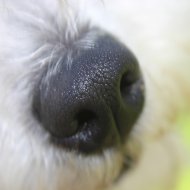
Ground-breaking trial will establish if dogs can detect breast cancer from breath samples.
Medical Detection Dogs has been granted permission to begin the world's first ever breast cancer detection trial using the incredible power of a dogs sense of smell.
Founded in 2007, the Buckinghamshire charity has established a reputation in training dogs to detect prostate, renal and bladder cancer using urine samples. It is seen to be the world-leader in its field and advises other smaller clinics in Europe, Australia and the US.
Although it has not yet been determined what it is the dogs detect, it is thought that volatile substances emitted by cancerous cells are present in the urine of cancer patients and give off an odour which is perceptible to dogs.
Dr Claire Guest, founder and CEO of Medical Detection Dogs, who will be principle investigator of the trial, hopes to find volatiles also present in breath samples collected from breast cancer patients.
Dr Guest commented: “This is such a fascinating area to study. It doesn’t seem necessarily logical that breast cancer should lead to volatile substances to be present in breath samples, but we have seen sufficient anecdotal and minor trial evidence to feel confident this is an avenue well worth pursuing.
"If it works, it will revolutionise the way we think about breast cancer."
The charity hopes that they will eventually be able to assist scientists to develop e-noses - electronic systems that are able to detect the odour of cancer through simple, low-cost and non-invasive tests.
Dr Guest said: "If we can prove the principle that breast cancer is detectable of a person's breath, machines could eventually detect that odour."
Previous trials carried out by Medical Detection Dogs include a 2004 study into the detection of bladder cancer using urine samples. The charity has also been working with renal and prostate samples - with prostate cancer achieving a 93 per cent accuracy when sniffing urine samples, compared to the 73 per cent of traditional PSA testing.
Earlier this year, Medical Detection Dogs were invited to demonstrate their work as St James's Palace to an audience including Prince Charles and the Duchess of Cornwall. The Duchess subsequently became a Patron to the charity, which also has the support of welfare and pensions minister, Iain Duncan Smith and comedian Bill Bailey.



 The veterinary mental health charity Vetlife is inviting the veterinary community to join it for a sponsored cold-water dip.
The veterinary mental health charity Vetlife is inviting the veterinary community to join it for a sponsored cold-water dip.